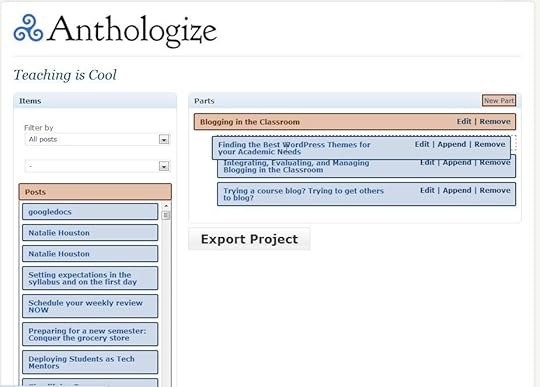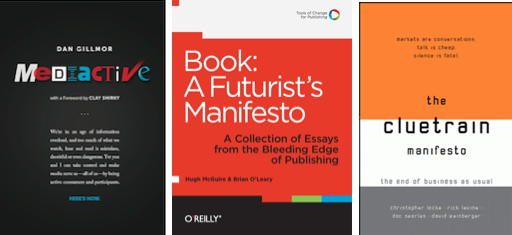Jane Friedman's Blog: Jane Friedman, page 199
December 2, 2011
Writing Advice That Saves You in 5 Years
I just discovered this wonderful article, "Steal This List," by Janis Hubschman (featured in the latest Glimmer Train bulletin). It features advice that's worth saving over a period of years—the kind of advice that's critical to planning, writing, and revision. Here's a taste:
When the story stalls, ask: what is the character thinking now? Is she thinking anything? If not, why not? Characters need to learn something about themselves, about their values and assumptions.
To gain insight into a character, consider her history: Think about what happened before the story, what tortuous path led the character to this particular moment?
Allow the character to misinterpret another character's words or actions. In life, we often misread a situation, jump to conclusions. Interesting things can happen when characters make presumptions or project their own hang-ups onto others.
Read more wonderful gems from Hubschman right here. Or go browse other articles in the latest Glimmer Train bulletin.
November 30, 2011
Writers Need More Copywriting Training
Today I'm the featured contributor at Writer Unboxed, where I talk about copywriting:
The No. 1 Overlooked Skill for Every Author
I'm not quite ready to admit that headline is hyperbole—I'd rather say it's brilliant copywriting.
When it comes down to it, every writer—if they want to earn a living from their craft—must learn how to sling words persuasively, whether for a query letter, book jacket copy, or a grant. Click through to read my take, plus find best resources for improving your copywriting skills.
November 29, 2011
Turn Your WordPress Blog Into a Book
I've written about this tool before, but so few people know about it—and it's so incredibly useful!—that it's worth mentioning again.
Anthologize is a free plug-in for WordPress-based sites and blogs that allows you to manipulate and edit your site content into a book. (Unfortunately, this plugin will only work with self-hosted WordPress sites, not WordPress.com sites.)
Anthologize has drag-and-drop organization, and it exports your content in formats ready for print or digital distribution. Here's a screenshot showing how easy the interface is.
It's also possible to edit your posts within the Anthologize interface (inside WordPress). Posts that you might edit here, as part of a specific book project, do not modify your live, original post on your site. Cool, huh? There's also an append function that allows you to mash posts into one another.
Other functionality includes:
Importing content from an RSS feed or external source (use responsibly!)
File exporting options of EPUB, PDF, TEI, and RTF
Image export if they're included in your original posts
Anthologize is active on Twitter (@Anthologize), plus visit the user forums here. It's an insanely valuable tool, and if you have a TON of content on your site or blog, it can help you transform it into a completely new and wonderful project.
November 28, 2011
3 Reasons to Have a Website If You're Unpublished
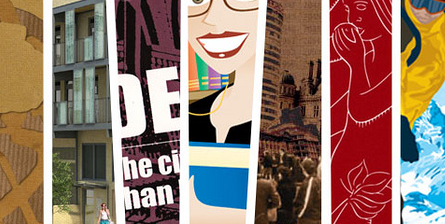
J Garrattley / Flickr
When I tell writers it's mandatory they have a website, those who are unpublished will immediately ask, "But what do I say on my website if I'm unpublished?"
I'll answer that question in a moment, but this question assumes that there's no benefit to having a site unless it's to market, promote, and sell a book. But there are several good reasons to start a site even if you're not yet established.
Get over the learning curve. While it's easy nowadays to get a full-fledged site up and running in 24 hours, even with your own domain name (through services such as WordPress.com), you still need to learn new systems and become accustomed to new tools. Don't wait to start this process until the day you need a site. Educate yourself in advance. Start building a simple site today so you can have a killer site when it's most important to you. Here's an example of a simple and effective site by an emerging writer.
Build awareness. In marketing communications, you have to distinguish between goals that are to (a) make a sale and (b) build awareness. At least half of the advertising you see is meant to build awareness rather than make a sale. Why? Because we're more likely to buy a product we've been hearing about—assuming a positive impression has been formed. Having a site (and participating in social media) helps build awareness of who you are and what you do. As positive impressions collect, it's an investment in your future success as an author or provider of services.
Open up opportunities. You never know who might visit or stumble on your site. You never know who's listening. You never know who's searching. When I had my own website that wasn't connected to my employer, many more opportunities opened up because it was clear how people could contact me, what I could offer, and who I was already offering it to.
I consider items 2 and 3 to be gravy. No. 1 is the biggest deal; get comfortable with the tools before you get into the serious work.
So, what do you say on your site if you're unpublished?
Keep it simple. You might need only 1-2 pages on your site, your welcome/summary page, and another for an extended bio. Your site should link to your other social profiles online (Facebook, LinkedIn, etc).
Don't belabor your unpublished status. You deserve to have a site if you're unpublished; it helps indicate your seriousness about your career. But you don't need to explain, at length, your journey to get published or your attempts to find an agent. Briefly describe the type of writing work you do, and leave it at that.
If you do have credits, list them. They don't have to be major credits. Local and regional publications count, as do blog posts and online articles. Link to anything that's available to read online.
You don't have to blog. If you are interested in blogging, here's my 101 advice (in PDF form).
Include contact info or a contact form. A good head shot is nice, too.
Still have questions about the benefit of a site or what should be included on it? Ask in the comments!
November 25, 2011
3 Free Books to Open Your Eyes to the Future of Authorship
In my most recent e-newsletter, I discussed 3 books (free to all!) that I consider mandatory reading for every author. If you didn't receive the newsletter, you can view it here.
The three books are:
Mediactive by Dan Gillmor
Book: A Futurist's Manifesto by Hugh McGuire & Brian O'Leary
The Cluetrain Manifesto
My newsletter explains the value of each one to both new and established writers. To never miss an issue of my e-newsletter, click here to suscribe.
November 24, 2011
Platform and Social Media Must Not Be Your Center
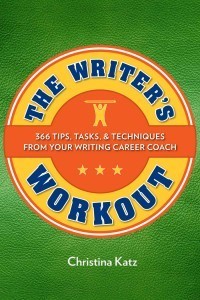
Today's post is excerpted from The Writer's Workout: 366 Tips, Tasks, & Techniques From Your Writing Career Coach (Writer's Digest, 2011) by Christina Katz.
With so much emphasis on the social networking aspects of creative careers these days, you might expect an expert on author platform building to promote an extremely social approach. But I focus on the creative person as an expressive individual instead. I want to help you cultivate creative confidence and express literary ability through writing. This is what belongs at the center of your writing career. Period. Here are three tips on author platform that give you an idea of my philosophy.
1. Eschew Branding
The second you put "my brand" at the center of your writing career is the second you suck all the air right out of your creative process. Many preach the gospel of branding for the benefit of creating fans, but from the perspective of creating, branding is the kiss of death.
Being a brand is like having to walk around wearing a sandwich board. No sooner do you become a brand and it's going to get old, bring you down, weigh heavy on your creativity, and potentially even hurt business.
So don't let those who insist that writers brand themselves take away the expressive, evolving pleasure of your natural dynamic and turn it into something packaged, phony, and forced.
As soon as you feel like you can't follow your creative spark, you are going to wonder why all the branding baloney being served up all over the place ever sounded like a good idea.
Put your natural creative dynamic at the center of your writing career and you will soon wonder how you became so engaged, prolific, and productive. Your career will evolve naturally, unhindered by labels. Most importantly, you will be able to serve your audience and grow in a natural way.
2. Maybe You Should Work on Your Platform Later
Are you eternally frustrated by the siren calls to hurry up and build your platform before you've had a chance to find your legs as a writer?
Forget that nonsense! Find your writing legs first and work on your platform later, when the timing feels right to you.
There is only one logical time to start working on your platform and that is when you feel moved to do so. Even if you are the most reclusive writer in town, I believe that you know on an intuitive level when the time is right to start ramping up your platform.
The right timing usually coincides with the desire to take your work public. But don't forget to give yourself time to adjust to the learning curve. Just because we decide we are ready to learn about something, it still takes time to absorb and apply all the lessons.
When I built my platform in advance of my first book deal, nobody told me to do it. I did it because it was a natural part of my creative momentum. What was bubbling up inside was ready to come out and be shared. I was seeking and building an audience intuitively.
Would it help your writing to shut out all of the yammer and calls to action that can be found everywhere and that only serve to throw you off your game?
Now that we have the Internet, we had better get used to the chronic calls to action. And we better get used to ignoring all but the quality messages we don't want to miss.
Because the alternative is living in a constant state of overwhelm.
3. You Should Not Be Constantly Available or Accessible
For writers, social networking represents excellent opportunities. We can poll our networks, create hubs of students, and participate in a virtual roundtable discussion that never could have happened in the past.
There are benefits for our networks, as well. They can connect with people whose work they admire and discover what they are actually like in real life. For example, if you are my friend on Facebook right now, you know my husband is directing a musical, my daughter is playing her first leading role, and that I am very busy writing this book on top of my regular teaching and writing load.
But what I'm not is constantly accessible because if I were constantly available I would not be able to run my writing career. Instead, I use social networking as a way to be in touch with those I want to connect with without taking on any pressure in the relationship to perform tasks or accommodate behavior I did not explicitly intend or invite.
I do not follow the advice of marketing gurus, who might advise me to milk every ounce of tolerance out of my network of friends and followers. Instead my behavior is professional and consistent, while occasionally sharing some of my personal life plus some of my offerings.
I use the Internet as a tool to connect with others where we can hang out, take a break, blow off steam, vent, and find refreshment. And that's why I don't get sick of it, because I don't abuse it or worship it. I see social networking as a tool that we are very fortunate to have.
Social networking is a place to chat, to share, to decompress—and the folks who want to turn this lovely water-cooler break into a constant marketing machine are going to wear out its good graces.
Christina Katz's newest book, The Writer's Workout, offers inspiration, stamina, and power to take charge of your writing life—every day. Click here to read more from the book. Christina is also author of two other books for writers, Get Known Before the Book Deal and Writer Mama. She holds an MFA in creative writing from Columbia College Chicago. Learn more at ChristinaKatz.com.
November 23, 2011
Writing on the Ether

iStockphoto / CharlieBishop
Is that a nest you're sitting on?
Library ebooks: If it walks like a Penguin …
Self-Publishing Babylon: And talking peace in the valley
A Swell new book: And how to handle criticism
Ethics in fiction: Beautiful dead girls
Extra Ether: Good stuff
Is that a nest you're sitting on?
So crikey. Just when you think you have it all worked out—the difference in mammals and publishers—you look up or down or somewhere and find a big surprise. Right under you. Can a Big Six publisher really lay one of those?
Here we are, having our pre-Thanksgiving picnic on the hillside of publishing. Surveying the battle below. We kibitz a little, as some of our most self-congratulatory DIY authors fight The Bird That Walks Upright Like Us. Over the territory called Book Country. We're actually going to hear from a peacemaker on that one–there could be another bird on the scene, one called a dove.
But first, boom! Followed by the pitter-patter of little flippers on linoleum. Look! Over at your library! It's a bunch of short guys in tuxedos running away with the ebooks!
The publishing industry makes pilgrims look like sensible dressers.
While you're bent over double trying to buckle on thine shoes, we're dodging another big bird, The One Who Gobbles. We're gassing out the Ether a day early this week—the effluvium usually gathers here on Thursdays. By super-heating our airy bower, we hope to better enjoy the Cornucopia of Uproars with which our pioneers in digitalia have roiled themselves of late.
Then we'll explore something Swell in book criticism. And we'll call into question that dubious genre, Beautiful Dead Girls.
Going forward—and have we ever gone backward? don't answer that—I'll add an update or two to the Extra Ether section below and tweet it madly, as is my wont, so you might find a fresh whiff or two here, even while hunkered for the holidays. Honk if you have pumpkin pie.
Allora. To the barricades, or to the dogs, whichever comes first.
And my best wishes for the special displays of gluttony with which we annually demonstrate our collective gratitude.
#bbpBox_132170965714087936 a { text-decoration:none; color:#1F98C7; }#bbpBox_132170965714087936 a:hover { text-decoration:underline; }I don't care how organized and sane you make it sound, I am NEVER hosting Thanksgiving dinner without a lobotomy: http://t.co/dp07jJGB[image error]November 3, 2011 2:03 pm via web Reply Retweet Favorite Ginger Clark
Library ebooks: If it walks like a Penguin …
Last week Penguin sent notice to OverDrive that it is reviewing terms for library lending of their eBooks. In the interim, OverDrive was instructed to suspend availability of new Penguin eBook titles from our library catalog and disable "Get for Kindle" functionality for all Penguin eBooks.
That's how Laura Hazard Owen at PaidContent quoted OverDrive, the main distributor of books to libraries. OverDrive's homepage makes it clear just how vested they are in "ebooks from your library, everywhere and anywhere."
But with that posting on OverDrive's site, a not-so-funny thing had happened to library patrons on the way to Thanksgiving.
At The Digital Shift, a site that's focused "on libraries and new media," Michael Kelley posted Penguin Group USA to No Longer Allow Library Lending of New Ebook Titles and updated with a quote from Penguin Group (USA) media relations manager Erica Glass with a bit more:
Penguin has been a long-time supporter of libraries with both physical and digital editions of our books. We have always placed a high value on the role that libraries can play in connecting our authors with our readers. However, due to new concerns about the security of our digital editions, we find it necessary to delay the availability of our new titles in the digital format while we resolve these concerns with our business partners. Penguin's aim is to always connect writers and readers, and with that goal in mind, we remain committed to working closely with our business partners and the library community to forge a distribution model that is secure and viable.
In a phrase, the community at large isn't entirely buying it.
#bbpBox_138996633445732352 a { text-decoration:none; color:#706238; }#bbpBox_138996633445732352 a:hover { text-decoration:underline; }Hey @about 20 hours ago via TweetDeck Reply Retweet Favorite Don Linn
Michael Cader at Publishers Marketplace (which requires a very worthwhile subscription) was the first to raise the specter of Amazon in Penguin Cancels Kindle Library Lending, For Now–Will Others Follow?
Though OverDrive had promised in April that (library) patrons' "confidential information will be protected," in implementation their program is an engine for turning library users into Amazon customers… they send patrons directly to Amazon's site for processing. Some publishers believe this violates their contracts with both OverDrive and Amazon.
#bbpBox_139029891701145601 a { text-decoration:none; color:#0084B4; }#bbpBox_139029891701145601 a:hover { text-decoration:underline; }@about 18 hours ago via HootSuite Reply Retweet Favorite Ron Charles
Owen shows you the very-Amazon page you land on to get your ebook in her follow-up post, Why Might A Publisher Pull Its E-Books From Libraries?
Notice anything? Yeah, it looks an awful lot like an Amazon shopping page and I have to be logged into my Amazon account to get the book… The NYPL's Christopher Platt recently told Publishing Trends that since Kindle added library lending, "Our average new patron registrations have more than doubled from 80 a day to 172 a day. Average daily e-book checkouts increased from 1,161 to 1,511 [23.2%]. Kindle downloads account for 33% of that use" (Kimberly Lew, Publishing Trends, November 2011).
Two more potential motivations for Penguin's withdrawal of library books from the system are included in Owen's observations: Perhaps "Penguin thinks people are checking out e-books from non-local libraries" and maybe "Penguin is worried that e-book checkouts from libraries will cut into sales."
None is fully convincing, however, at least not to the Tweet Chorus of publishing observers who have gathered in holy semicircle to tear a little hair and gnash a few teeth.
#bbpBox_139007755938824192 a { text-decoration:none; color:#088253; }#bbpBox_139007755938824192 a:hover { text-decoration:underline; }@about 19 hours ago via Twitter for Mac Reply Retweet Favorite Kassia Krozser
Like an early thespian's nightmare in which Euripides and his lead actors all nip off for baklava at intermission, the main voice is missing. Neither Glass nor anyone else from Penguin, as of this writing, seems to feel she or he can engage in the debate.
Once more, as I've mentioned in earlier vapors here, our large best-established houses seem to be somewhat PR-deaf and unable to understand the importance of communicating with those most important of all folks, the customers.
#bbpBox_139024636125003776 a { text-decoration:none; color:#0084B4; }#bbpBox_139024636125003776 a:hover { text-decoration:underline; }I predict in 5 years (1) major publishers will sell frontlist to libraries on a per-read basis; (2) per-read fees will be 40-70% retail.[image error]about 18 hours ago via web Reply Retweet Favorite Tim Spalding
I'll leave you for now with Michael Kelley, again, in a new post, Librarians Face Patrons Unhappy With Penguin Policy Change; ALA Condemns Ebook Decision. Noting that Penguin's decision "has left librarians once again facing patron gripes," he quotes American Library Association president-elect Maureen Sullivan doing a far better job of stating the public's and customers' interest than the black-and-white fowl is doing for itself:
If Penguin has an issue with Amazon, we ask that they deal with Amazon directly and not hold libraries hostage to a conflict of business models. This situation is one more log thrown onto the fire of libraries' abilities to provide access to books – in this case titles they've already purchased. Penguin should restore access for library patrons now.
#bbpBox_139104485585858560 a { text-decoration:none; color:#FF3300; }#bbpBox_139104485585858560 a:hover { text-decoration:underline; }With five of the "Big Six" not playing nice with libraries on ebooks, which smaller publishers are poised to fill the void? #dbw[image error]about 13 hours ago via HootSuite Reply Retweet Favorite Guy L. Gonzalez
Self-Publishing Babylon: And talking peace in the valley
A new program from Penguin that made me throw up in my mouth when I read about it… Book Country, which debuted in April as a place for authors to post their work for critique, recently announced a program to turn manuscripts posted on their website into ebooks and paper books…I'm blogging about this to warn newbie authors NOT to use Book Country. This blog gets more traffic than Book Country does, so hopefully anyone looking for "Book Country" on search engines will find this post and learn what a Very Bad Idea it is to use Book Country's services.
Yes, it's the same bird again. Penguin. And it's Joe Konrath. With characteristic zest, he goes on:
What is Book Country doing for you that entitles them to 30% royalties? Especially if/when you pay for the formatting?… I've sold 500,000 ebooks. If I'd published with Book Country, they would have taken $290,000 in royalties from me. That's just awful.
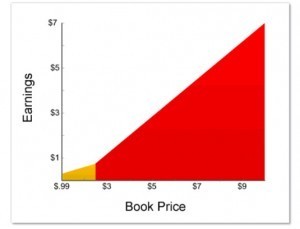
Book Country Pricing & Earnings November 2011 / BookCountry.com
Well, since we don't have a direct answer to Konrath's "what have they done for you lately?" question, I'll offer you the Book Country site's Publish Your Book pages.
And here is, specifically, Pricing & Earnings, in which the afore-disdained 30 percent figure is mentioned.
I'm even adding Book Country's chart, no extra charge.
As a matter of Ethereal housekeeping, may I point out that the proper Twitter handle for Book Country is @Book_Country? Note the underline between "Book" and "Country," hearth and home.
Someone identified by Twitter as a Mr. John Helling has, I fear, found himself the subject of a great deal of misdirected agitation.
#bbpBox_138658856258633728 a { text-decoration:none; color:#b83c16; }#bbpBox_138658856258633728 a:hover { text-decoration:underline; }No matter what your feelings about Book Country may be, tweeting them angrily at @November 21, 2011 11:43 am via HootSuite Reply Retweet Favorite Book Country
In this instance of barely collegial debate, there has been more response, I'm glad to say, from the penguinery. Nothing directly addressing the royalty issue as Konrath and others have energetically raised it. But in response to PaidContent's questions, we do have this from Penguin on the second page of Owen's initial write, Self-Published Authors Sharply Criticize Penguin's Book Country .
As for the sales transactions after a book has been published, like many sites, Book Country takes a percentage of each sale of a book. When we distribute your book out to other sites, the third party sites also take a percentage. This is not unusual. This is how many new publishing operations function. In contrast to traditional publishing houses, Book Country offers the author a much higher percentage since Book Country is not incurring editorial, marketing or publicity costs. Book Country is incurring costs to code the professional ePub file, set-up the print file for printing, distribute the book files and the metadata out to all retailers, account for incoming sales in multiple channels, and pay out to authors on a monthly basis. Not to mention the cost of maintaining the Book Country site and all of the tools, like the Genre Map, that are meant to help authors actually find paying readers, very valuable benefits. Book Country can make your book available everywhere that ebooks are sold.*
*Except maybe to libraries? Sorry, I don't know what came over me.
None of this mollifies some who have gone to the megaphones to condemn Book Country's offer.
#bbpBox_138627844745080834 a { text-decoration:none; color:#1F98C7; }#bbpBox_138627844745080834 a:hover { text-decoration:underline; }Way too much negativity, innovation is crucial, @November 21, 2011 9:40 am via web Reply Retweet Favorite David Nussbaum
Oh, the New Vanity (of Penguin & Book Country), writes Will Entrekin. "In general, the only thing worse than 'self-publishing,'" he writes, "at least in the eyes of corporations and those associated with them, is 'vanity publishing.' Paying to make your book."
Penguin Launches Rip-Off Self-Publishing "Service" Targeting Inexperienced Writers, writes David Gaughran. He decries:
"The wall-to-wall, uncritical coverage from the likes of eBookNewser, Publishers Weekly, and the Wall Street Journal… Here's the opener from yet another Book Country puff-piece – this time from the UK broadsheet, The Guardian (by Allison Flood): "Want to be published by Penguin, the historic press which is home to authors including Roald Dahl, Beatrix Potter and Kathryn Stockett? Now you can be – and for as little as $99 (£60), as Penguin's American arm announced a move into self-publishing."
Something Else Penguin/Book Country Should Be Ashamed Of is at the blog-stead of David P. Vanagriff, the artist formerly known as Passive Guy. Here, we find JW Manus holding forth with a boisterous comments section—into which dropped Colleen Lindsay, Book Country Community Manager, to clarify points of the Terms of Use.
#bbpBox_138626336611774465 a { text-decoration:none; color:#0099B9; }#bbpBox_138626336611774465 a:hover { text-decoration:underline; }@November 21, 2011 9:34 am via Seesmic twhirl Reply Retweet Favorite Sarah Weinman
Agree or disagree with Book Country's Lindsay, at least someone at Penguin did engage in the discussion this time, something I wish the corporate parties felt they could do more frequently. Here is a bit of Lindsay on whether the rights to work entered into the Book Country community are encumbered.
In short: No, your rights are in no way encumbered by Book Country if you choose to post a portion to the community for workshopping services. Period. You also own the copyright to all the fiction you publish to the site. Period. The long legal answer: We worked with a large group of agents and editors (and not only Penguin editors) when we put together the Terms of Use. We also confirmed with all of them that they would not consider a writer's work to have been "published" if the writer were to upload a portion of that work to a community site for the purposes of workshopping and getting critiques.
Of course, before the marshmallows are on the sweet potatoes, we've heard back from Manus in My Answer to Colleen Lindsay the Book Country Community Manager: "What I really don't expect is for legitimate publishers to join the ranks of scammers, con artists and outright crooks in fleecing overly hopeful and desperate writers."
#bbpBox_138655750712070145 a { text-decoration:none; color:#0084B4; }#bbpBox_138655750712070145 a:hover { text-decoration:underline; }@November 21, 2011 11:31 am via Twitter for iPhone Reply Retweet Favorite Matt Mullin
Basta. In calling a truce long enough to get to the next item, I'm turning to Mick Rooney of Dublin, at the Independent Publishing Magazine.
"I've a mixed opinion on this," Rooney writes, immediately winning me over. (You mean everything isn't black and white?)
I'm going to quote Rooney at some length from his Book Country – For or Against Self-Publishing? For an Irishman, he sounds like he knows a thing or two about the American concept of Thanksgiving.
Konrath, Gaughran, Hoffelder, Linda Welch, Katie Salidas, Manus, Entrekin, yea, and Penguin's newly promoted (congratulations) Molly Barton and Lindsay, Dasher and Dancer, as well: Hold your fire. And have a look.
For so long the self-publishing community has fought for acceptance and recognition within the publishing industry. Just when we have eroded some of the stigmas, and proven that some self-published authors and their books can compete at the forefront of publishing, it would be a shame to start to show a divided front in self-publishing. I understand Joe Konrath's ire because he came from a foundation within traditional publishing, did an about turn, and embraced the changes and benefits for the author as an individual business concern by self-publishing. So, I can understand him having a pop at one of the Big Six when they 'cream' it off the little guy. I'm just offput by Joe's 'Harry Enfield's Loads a Money' approach to highlighting his success, and that that should be the underlying perception of self-publishing to new authors entering the precarious field of self-publishing. Because the reality of self-publishing is far from the world of Konrath.
One of the greatest strengths of self-publishing over the past few years has been its adaptability, using online communities to celebrate, disseminate and promote books, as well as passing experience on, author to author. Crucially, it's no substitute for connecting with readers, unless all your readers are authors themselves! Readers congregate on forums like Amazon and Goodreads – hybrids of publishing/sales platforms. The biggest challenge for the self-publishing community is to stretch beyond selling books to its own community, and it's important we are as critical of ourselves as we are so openly to criticize the broader publishing industry.
Divided we fall – united we conquer.
#bbpBox_139260404550483968 a { text-decoration:none; color:#0066CC; }#bbpBox_139260404550483968 a:hover { text-decoration:underline; }How our insane weather is ravaging our Thanksgiving dinner: http://t.co/OUMFj5GB /@about 2 hours ago via TweetDeck Reply Retweet Favorite Fast Company
A Swell new book: And how to handle criticism
"Towel," she said. "Orange, close your mouth, and go get me a towel." I wondered why I should take orders from this woman. She was as vulnerable as someone gets; she had been very mean to me; and she hadn't yet even said hello. So I fetched her a towel.
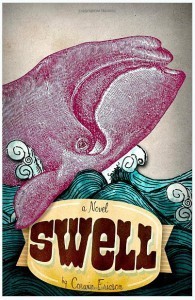
SWELL cover design for Dark Coast Press by Chris Jordan with Charlie Potter
In my review of Swell, the debut novel from author Corwin Ericson at Reader Unboxed this week, I had the happy chance to amplify that best of catches: a new, agile, rambunctiously intelligent voice. "Ericson has every reason to be proud of his knack for worldly wordplay," I wrote. "When he summons up the courage of that intelligence, he sings to his reader in chanteys of bunk-bed bunkum, flattering you with his assumption of your savvy."
Hm. That's sort of fun, quoting oneself.
"Such quick arcs of spin and recognition," quoth me, "are what make Swell swell, and they work when Ericson trusts you to keep up."
Now, as part of this critique, I knew I had to run the happy boat aground briefly and hash out some problems of production, "in this Moby on the way to .mobi." Among them, I wrote:
the opening two words of chapters are stuck together
there are repetitions of articles, as in this phrase (underline mine): "Korean Ill John, was wearing a a black nylon jacket"
curious gaps open in the text from time to time
one character's answer frequently is stuck in the same paragraph as another character's question.
And then, I heard back from the publisher, Aaron Talwar at Seattle's Dark Coast Press. Talwar has granted me to quote some of his e-mail to me about Swell:
I would like to let you know a little bit on what happened in the transition to the e-book edition. As a small publisher with a limited budget, we were "taken for a ride" on what happened with the final version of the electronic copy. We did not catch all of the mistakes that you so graciously pointed out but I we are hurriedly re-connecting with the people that made the electronic version to amend any and all of the mistakes at their cost. As for the standard of our editor and our team, I stand by our work and I know how much time went into making it as perfect as possible. Unfortunately, things were missed and they will be sure to also go into being fixed as well. It is not a standard we live by and I openly apologize to anyone whose reading experience was effected.
First, take a moment to appreciate what a big "small" publisher it takes to let me enumerate the flies in this ointment so gracefully. This is one of the most responsible, forthright, and cordial responses I've encountered to criticism, and I've been reviewing one poor victim or another since the 13th century or so.
Second, Talwar is right to mention the travails encountered by anyone, especially small houses on lean budgets, in outsourcing conversion work, the formatting it takes to "go digital," as all books must now go. It's probably too easy for many of us to forget this.
But in case it's of use in understanding what's happening, I'll give you a little insight into the massive online operation I was with for many years, CNN.com. There, our execs learned to have our developers sit with us on the newsroom floor and study what we did, as journalists, writers, editors, producers, anchors, correspondents, before even beginning to build a new CMS (content management system) for that vast site. We had discovered that our truly expert developers were not, predictably, editorialists.
And this is what we're seeing today. A company with the superb intentions of Talwar's Dark Coast Press, an author with the surface-breaking panache of Ericson, all your kingdom's horses and a few of the best women in computers anywhere still cannot overcome the fact that precious few technical folks have the editorial chops to truly know what's required to hit the mark of high-quality publishing.
Do I have an answer for you? No more than Ericson's Candide, one Orange Whippey, has a clue to how he's going to get home to his cat Rover tonight.
But I know that's what we're dealing with. Unless you can sit with your conversion people, as we sat with our CNN web virtuosi, and collaborate on turning this screw, we're going to see such intriguing talents as Ericson and such dedicated producers as Talwar slipping and sliding across bad patches of seaweed they didn't put on the beach, themselves.
We'll push off on a high tide, courtesy of Ericson.
It was subtle theater, each of us trying to outbore the other through shades of inaction, and I supposed I was a mere spear-carrier in the production. I locked my knees and pretended I was getting paid. That which doesn't kill me only makes me older.
#bbpBox_138705530842644480 a { text-decoration:none; color:#FF3300; }#bbpBox_138705530842644480 a:hover { text-decoration:underline; }Cordial author responses make my Grinch's heart swell. #Cheers[image error]November 21, 2011 2:49 pm via HootSuite Reply Retweet Favorite John M Cusick
Ethics in fiction: Beautiful dead girls
Dead girls in water, dead girls in bathtubs, dead girls in forests, dead girls in pretty dresses. Girls who might be dead, or might just look dead. Dead girls in so many pretty dresses…. Most of the images aren't blatantly violent or overtly sexual. It might be more appropriate to call them glamorized—they seem less the product of overt "male gaze," and more the product of teenage girls' morbidity. Rather than presenting the idea that violated and dominated women are sexy, these images present the idea that it is beautiful and dramatic and—as Poe would have argued—poetic to be dead.
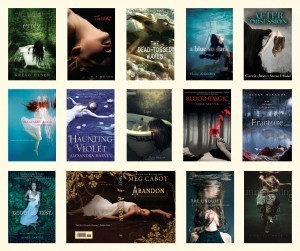
From Rachel Stark's Trac-Changes blog
Rachel Stark in Cover Trends in YA Fiction: Why the Obsession with an Elegant Death? argues that "this book cover trend—and the larger obsession of teenage girls with the concept of beautiful death—is at least in part the product of internalized misogyny." Without leveling blame, Stark defines a trend in young people's literature that's anything but beautiful.
I admire Stark's courage and agree with her assessment, especially when I see female authors churning out undead romance peopled with women begging guys to bite them to death. When Bram Stoker wrote his 1897 kill-me-you-handsome-vampire shtick, we knew exactly who was victimizing whom. Sadly yes.
In Stark's compilation of covers, I see three men named as authors. I see twelve women. "Anecdata?" Maybe. Would I be wrong to assume that the majority of these YA works of the Beautiful Dead Girl genre are written by women?
Stark calls attention to another writer's shorter piece on the topic, the Californian teen services librarian Allison's A wee rant for Halloween: I see dead people. Allison's collection of covers adds three more female authors' names to the mix. Here's a little of what Allison writes:
I'm really tired of seeing books covers with dead-looking girls on them. It's kind of misogynistic, honestly. I mean, are there any covers out there with dead guys on them?… By no means do I intend to criticize the books with these covers, or their authors. These are some great reads! I know authors don't typically have input on their book covers, and to be fair, most of these books actually do feature females who have died, so it's not like their covers are totally off the mark. But just– isn't there anything else that could accurately represent plot elements from these books besides some poor girl's lifeless eyes staring out into space or limp, pale body flailing in an awkward position? It's, like, the opposite of empowering.
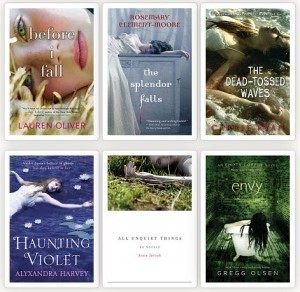
From Allison's Reading Everywhere blog
I'll say it before you can: What do I know? Rather than judge these authors by their covers, I'm asking. What do you think of Stark's and Allison's misgivings? Especially when it comes to women writing for young women, what is this Beautiful Dead Girl stuff?
We need not spend time here on the authors-have-no-control-over-book-covers fact of life. We all know that.
I'm more interested in the message that generates those covers, the message that these books convey to young readers.
I'd like to hear from writers in this genre. That's why Jane Friedman gave us the comments section below. You'll find me down there, being gnawed to pieces in the twilight by toothy self-publishing authors as I hand the stake back to Stark for the last word:
I don't fault YA publishers or the covers above for this trend. As I said, I see those covers and the demand from which they stem as the product of, not the force behind, internalized misogyny. But, looking at them as a reflection of teenage girls' psyches, I'm saddened by what I see and left feeling helpless in the face of forces that seem unstoppable. In the apt and succinct words of my good friend Jenny, "I know that we have to trust teenage girls to cope and persevere and come out of this fight kicking, but honestly I'd rather make all this shit go away." This time around, I pretty much agree.
#bbpBox_138344179473453056 a { text-decoration:none; color:#4b656b; }#bbpBox_138344179473453056 a:hover { text-decoration:underline; }I know I ought to cook for the Thanksgiving potluck I'm hitting up tonight, but I just want to nerd out about narrative structure some more.[image error]November 20, 2011 2:53 pm via web Reply Retweet Favorite Rachel Stark
Extra Ether: Good stuff
Fast facts about Thanksgiving Day, from the good folks at InfoDocket, grazie.
248 million: The number of turkeys expected to be raised in the United States in 2011. That's up 2 percent from the number raised during 2010. The turkeys produced in 2010 together weighed 7.11 billion pounds and were valued at $4.37 billion.
No word on the penguin population.
#bbpBox_139008400917934080 a { text-decoration:none; color:#0084B4; }#bbpBox_139008400917934080 a:hover { text-decoration:underline; }Whoever keeps calling me from a blocked number, yes, I am screening you. Leave a damn message already so I can not return it.[image error]about 19 hours ago via TweetDeck Reply Retweet Favorite Jeff Bercovici
Three Keys to Success: Show Up, Be Present, and Hope for Serendipity from Dan Blank.
As many of us celebrate Thanksgiving this week, I am considering…those who have made the effort to show up, to care. Those who push, who expand what is possible. Those who make me a better person simply by being present in my life.
Porter Anderson is a Fellow with the National Critics Institute, and a producer and consultant formerly with the United Nations World Food Programme in Rome and INDEX: Design to Improve Life in Copenhagen. As a journalist, he has worked with media including CNN, the Village Voice, and the Dallas Times Herald. He reviews literary fiction at Reader Unboxed, and is based in Tampa.
November 22, 2011
The Best Literary Fiction Blogs & Websites
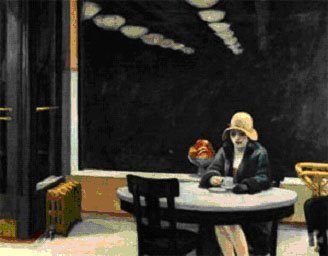
Automat / Edward Hopper
Earlier this fall, I was asked for a list of the best blogs and websites focused on literary fiction and culture. While I knew of a few, I put the question to my social network, and was able to curate the following list.
If I've missed any sites that deserve consideration, please let me know your favorites in the comments, and I'll consider expanding the list. (Note: I have deliberately excluded well-known traditional media, e.g., Publishers Weekly, New York Times, etc.)
Best Literary Fiction Blogs & Websites
The Rumpus . They claim to be about culture, rather than pop culture. Mission: "To introduce readers to things they might not have heard of yet." Twitter: @The_Rumpus. Recent post: All Over Coffee Collaboration With Daniel Handler
We Who Are About to Die . A group blog that covers a lot of territory. Run by Daniel Nester. Twitter: @WWAATD. Recent post:
The Millions . An online magazine offering coverage on books, arts, and culture since 2003. Twitter: @The_Millions. Recent post: Battle of the Heavyweights: Errol Morris vs. Susan Sontag
HTML Giant . I've enjoyed having my blog posts smartly ridiculed by HTML Giant. Many contributors, always a good read. Twitter: @HTMLGiant. Recent post: Blog Is Still a Four-Letter Word
The Nervous Breakdown . This site goes way beyond literary fiction and culture, but if you enjoy the other sites on this list, then check out this one, too. Twitter: TNBtweets. Recent post: New Directions in Publishing: Victor David Giron and Caroline Picard on Chicago's Indie Publishing Explosion
Rob Around Books . A very rare specimen: A blog that focuses on the short story. Twitter: @RobAroundBooks
American Fiction Notes . Not updated frequently, but quality over quantity. As the title indicates, this blog focuses on U.S novelists and short story writers. Twitter: @mathitak. Recent post: The Anxiety of Self-Influence
Bookslut . One of the oldest and best places to find out about new books and literary news, by Jessa Crispin. Twitter: @thebookslut
Maud Newton. Another one of the classics. Twitter: @maudnewton. Recent post: The Interbreeding of Middlemarch and Barthes
The Second Pass. Reviews, essays, and blog posts about books new and old, founded by a former HarperCollins editor. Twitter: @thesecondpass. Recent post: "It was just absolutely true."
Bonus: My longtime favorite aggregation site for broad arts & culture news: Arts & Letters Daily
Bonus #2: If you love literary culture AND mass media: The Awl
Add your suggestions and thoughts in the comments.
November 21, 2011
Too Many Facebook Friends: Blessing or Curse?
On my personal Facebook profile, I am slowly but inevitably reaching the cap for friends (3,810 of 5,000). It's prompting me to reflect on (1) how exactly I got to this point (2) how many people are turned off by this number (3) if *I* am turned off by this number and (4) what difference the number makes, if any.
I don't like talking about the number. I don't tell people about the number. (This blog post is a departure for me.)
But it's a number that occasionally comes up in real-life conversation, and I try to be as dismissive as possible about it. I feel embarrassed because I don't think it means anything except I've been on Facebook a long time, and I have a well-established website, blog, and social network. Plus I speak and serve in ways that bring me into contact with many hundreds of people each year.
I don't send out Facebook friend requests these days, but I still receive them, and I say yes to most. (A while back, I decided it would be OK to have an open friending policy on Facebook. Read my history of Facebook use here.)
I'm confident only a few hundred people are actually paying any attention to what I do on Facebook. The rest? I believe they're looking to expand their friend count, but they mute the people they friend.
That's what I have to do when these requests come in from people I don't know. I don't have time to read updates from strangers, plus I have no context for their updates.
So it's true when people say that anyone with thousands of Facebook friends can't possibly have quality relationships with them all.
Which maybe means I've become a micro-broadcaster?
Facebook has a new feature that allows people to "subscribe" to one another's public updates. I wish this feature had been in place years ago, because if it had, I could've directed people to subscribe to me rather than friend me. As you can see above, right now I have nearly 100 subscribers on Facebook. I find this a far more valuable number as far as engagement on Facebook, because it's people who actively want to be alerted, in their newsfeed, to new things I post.
Have we reached the point in social media where it's bad form to have too many "friends"—because you can't focus as much on quality? Does it mean you're not being selective enough? Conversational enough? Even controversial enough? (Some would say you ought to repel as many as you attract in order to ensure you've got the "true" community around you.)
Bottom line, friend count on Facebook has become a meaningless piece of data to me. I don't know what the right answer is to address this issue, but I do believe this:
I'm probably creating secret ill-will with people who know I can't possibly be reading their stuff on Facebook. So I become known as a disingenuous "friend."
To unfriend people would likely be worse than No. 1.
While I would never post anything on Facebook that I wouldn't post in public, I know my behavior isn't the same as if I had a very limited friends list. (I'm not interested in potentially offending hundreds of people.) I judge this as neither good nor bad, but it's something I'm very aware of.
Years ago, someone said that he expected before long that my Facebook posts would come with a secure way for my "friends" to input a credit card number to buy products or services.
My biggest fear is that people think I'm on Facebook to take advantage of them or monetize them. What I'm really there for is to keep the line of communication open (especially since Americans spend more time on Facebook than on any other site), and to post things of interest to people. I may not be able to read what everyone else is posting, but at the very least, I'm responsive and present to activity on my own wall.
My hope is that's why people are friending me in the first place.
To read some of my other posts on this topic:
Using Facebook to Amplify Your Reach and Not Annoy People
Should You Create a Facebook Fan Page? (a little out of date due to Facebook's new subscription feature, but strategies still solid)
What are your thoughts on Facebook friending, particularly as it pertains to your more "public" face?
November 20, 2011
What Scene From Your Past Would You Revisit?
This week's question was:
If you could go back in time & watch a scene from your life as an objective, outside observer, what would it be? And why?
I knew going in that responses on Twitter probably wouldn't offer anything meaningful, and I was right. In 140 characters, it's near impossible to answer the question. But Facebook responses were diverse, insightful, and lovely. Here is a sampling; I'll let them speak for themselves.
The birth of my daughter. There's so much I don't remember, and I'm reliant on the memory of others for certain things. I'd like to know exactly what drugs I was given, when, and why. I had a wonderful birth, but there were times I felt very out of control and dependent on others to act in my and my daughter's best interests. … and I'm a control freak like that.
—Melody Layne
The night my stepmother committed suicide. The Wizard of Oz was on, and all the kids knew something really out of place was going on, but we just focused on the TV like a life preserver to get through. I still can't watch it 40 years later without thinking about that night.
—Babs Mountjoy
The instant Dianna answered the door for our third date and I was struck speechless, KNOWING she would become my wife. We celebrate our 41st in January.
—Jerry B. Jenkins
I would observe myself as I interacted in precious, private moments with my son who had cerebral palsy and passed away far too soon at age 12. In those sacred parenting moments, I would see no disability, no need for advocacy, no judgment by others of my son's value, no loss of parenting dreams and milestones, just a mother's unconditional love for her child.
—Judy Winter
I'd want to see all the behind-the-scenes talks my folks had about me and my sisters as we were growing up. We always got the well-polished final product in the end (lecture, decision, etc.), but to see the messiness, debate and compromise leading up to it would hold many great lessons I'm sure on parenting and keeping a marriage together through it all.
—Stefanie Badders Laufersweiler
The three weeks I spent in the psychiatric ward … I'd like to compare my memories with what actually happened—the two are definitively not the same.
—Colleen Totz Diamond
The day I saw the "worm hole" or "stargate" and consider why I didn't walk through it—I was three years old.
—Sasha M Hitchner
And finally, there were some who dreaded the thought of revisiting the past …
Um … none thank you. Just the thought terrifies me.
—Amber Lynn
Nothing I can think of. I remember the pleasant events and have worked to forget the bad ones. I know that sounds flip, sorry, but I've really WORKED to forget the bad things … so I've revisited them from every angle already … and the good things, well, revisiting them would be painful too, but in a different way, you know?
—Holly Pettit
It sounds like something a mean god would make you do as punishment after you died—witness segments of your life. I'd rather look forward mostly because when I look at myself in the present or future, I see a much more brilliant person than the one who lived in the past.
—Nancy Yuktonis Solak
I think it would be like the scene in "Our Town," when Emily can't stand to watch it because she sees that nobody in her family is really looking at each other. "Does anyone really realize life while they live it?" she asks. "Every, every minute?" And the stage manager says, "No. Saints and poets, maybe. They do some."
—Deborah Bowman
So now I open the question up to you. Leave your thoughts in the comments.
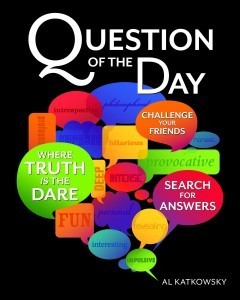 Every Thursday, I pose a question of the week on my social media networks, drawn from Question of the Day by Al Katkowsky. Read more here, and follow the chain of answers on Twitter with hashtag #qotw.
Every Thursday, I pose a question of the week on my social media networks, drawn from Question of the Day by Al Katkowsky. Read more here, and follow the chain of answers on Twitter with hashtag #qotw.
Jane Friedman
- Jane Friedman's profile
- 1882 followers





